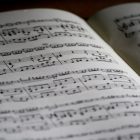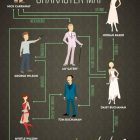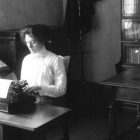Cornelia St. Café and The Perfect Sense Reading Series
I can’t think of a New York City poet who hasn’t read at the Cornelia St. Café and I don’t know of one who doesn’t look forward to doing so again. Tucked since 1977 into the block-long West Village street whose name it bears, the café hosts more than 700 literary, musical, and cultural events a year—two a night most nights—in its candlelit downstairs performance space replete with stage at one end and bar at the other. To walk down the café’s steep and grooved wooden stairs is to enter a place out of time, a contemporary landmark.
While temperatures on Manhattan streets were approaching triple digits, the near capacity audience crowding comfortably in for the Perfect Sense Reading Series looked downright cozy grouped around their café tables. It’s a testament to the quality of the two-year old series curated by Alissa Heyman that she was able to draw such a crowd at six pm on a scorching early summer Wednesday. The evening’s bill brought together two young poets to read with the evening’s headliner Alicia Ostriker.
Amy Lawless, a name as ready for fame as any I know, was the first poet to read and chose her long poem, “Barren Wilderness,” which she ranked as a four on what she termed “the darkness scale.” Lawless, who was interviewed for the Best American Poetry blog as a funny woman poet, followed her first poem by noting, “People like my poems because they’re funny” and read several shorter poems that bore her own brand of brazen quirkiness, such as this passage from near the end of “The Mona Lisa Remains Behind Bulletproof Glass”:
Somewhere there’s a guy thinking: “I’ll put a hole in that eye! Don’t you look at me that way. You’ll be sorry bitch. He’d love to knock her out with a suckerpunch
carry her to the bathroom of the Louvre hold the gun to her forehead &
wipe that stupid grin off her face
Rebecca Gayle Howell took her turn on the stage and read first from her translations of the contemporary Iraqi poet Amal al-Jubouri, Hagar Before the Occupation, Hagar After the Occupation, which she placed at 8.5 on the darkness scale. Howell did a fine job of providing cultural and historical context for al-Jubuori’s paired poems, which like the matriarch of Islam, Hagar, who ran between Safa and Marwa, pleading God for water, move between the years of the embargo and the years of the Occupation in Iraq. Here are two:
My Grave Before the Occupation
never wished for anything but to smell the earth of his childhood
never wished for more than to cover the indecent face of death
My Grave After the Occupation
started asking me whether I’m Sunni or Shi’ite
as if the dirt needs to know if I belong to him!
Howell closed her reading with a handful of poems from her own recently completed manuscript on themes of farm life, Render, including the poem “How to Cook the Lungs” from which I take these lines:
Feed them to the dog
Boil them with the heart
which no one eats alone
Boil them with the backbone
Who knows how breath of god
cooks down to mash?
And the poem
A Catalogue of What You Do Not Have
Enough
Alicia Ostriker closed the evening by reading from her recently published The Book of Life: Selected Jewish Poems, 1979-2011. There is little that I could add to the rightful praise already heaped upon Ostriker as one of the most important American poets and critics of the last forty years. It is simply impossible to be well read in contemporary poetry without knowing the intelligence and humanity of her work, but as the audience, which spontaneously burst into applause after many of the poems she read, witnessed, Ostriker’s import extends beyond what of her thought and experience she has committed to the page.
Perhaps now this sounds foolish. Perhaps it is irresponsible of me not to take this space to outline at least some of the historically significant material upon which Ostriker touched, but I tell you, on the darkness scale she was luminous. I was mesmerized and wowed. Perhaps I can use the close of her “West Fourth Street” to justify in part:
–If I think these men are the essence of the city
It is because of their beauty
Since I have learned to be a fool for beauty.
How many staid readings like funereal rites I have sat through like a child waiting to burst out of the doors of a temple or church, but not this June night in a basement of the Village. I tell you, the lady shone from her mouth and I was there and I only wish everyone who loves poetry had been as well. “Psalm” from the volcano sequence:
I pull my eyes away from the hills
I will not kill for you
I will never love you again
unless you ask me



